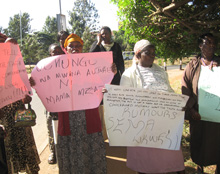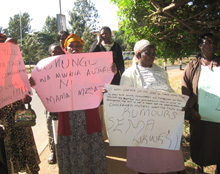Media Onslaught Will Erode Other Liberties

"It is said and rightly so that a government which fears free press is politically unstable.That is why such a government would endeavour to discourage free expression and political tolerance..." Mitch Odero
The historic celebration at Uhuru Park as Kenya turned a leaf from former President Moi to President Kibaki in 2003 portrayed Kenyans’ belief in the big leap from the dark ages of the successive colonial, Kenyatta and Moi hegemony into the sunshine of democracy, rule of law and freedom.
Regrettably, the more things change, the more they remain the same. Our present leadership is suffering from intense holdovers of the past in which they were incubated. In a world where free societies are celebrating the importance of free press, Kenya seems to have chosen the company of un-free states like Jordan, Kuwait, Lebanon and Libya. Although I have for long excused President Kibaki and accused his political handlers for leadership blunders, looking back: the rejection of the MoU, failure to fight corruption, recent election debacle and the tragic signing of the media gag bill; I must now give the devil his due.
Parliament and the presidency are powerful institutions; but power in the hands of short-term thinkers is like powder keg on one's lap. It is myopic thinking both at parliament and presidency levels that resulted in the adoption of the draconian Media law that polices journalism and broadcasts, instead of maximising media freedom both in a structural (business) sense and a social (speech–related) sense.
 |
| A section of Women carry placards in 'support' of the Bill |
Opportunities in media law
Despite all our leadership blunders as a society, we must not now wallow in a pity party but instead seize this moment to re-imagine and reinvent Kenya. The media belongs to the society as a whole. The presumptuous thinking in our leadership that only government pressure can regulate the media is unfounded and misplaced. The society at large is a much bigger censor than the government can ever be. For instance, when consumers are not happy with content on a media outlet, they simply flip channels to their preference. Since media exists both for information and business, the latter, being of primary importance to media owners; loss of profits is enough motivation for self regulation and censorship.
The suppression of media is symptomatic of an underlying leadership malady. As we slide into a society where press freedom is curtailed through fortified libel laws, lack of independent media, restriction of internet search engines and monitored correspondence Kenyans must consider these present happenings broadly. Contributively, the challenge to free press includes the absence of mature civil institutions such as a well functioning court system and a government framework that is free of corruption. Hence, it is difficult to free the press without addressing or building up complementary institutions. Independent media is necessarily connected to the broader effort to support democracy, the rule of law and human rights.
It seems that in the absence of political goodwill, press freedom will be recaptured at price. Therefore, if the media industry is really serious about press freedom, they must in the courageous footsteps of their predecessors, especially now, continue to report truthfully and boldly at the risk of fines, jail and even their own lives. In the event journalists are arrested, they should grace the jails as the bride graces her new groom’s room. Until our cells, courts, and jails are jammed with truth-tellers, the society lacks impetus for creative tension – the stuff progress is built on – and from which a new birth freedom shall be moulded. In this struggle we must not forget that we live in a modern space in independent Kenya but under an ancient leadership with a world view from the pre-independence era.
If journalists resolutely adhere to their calling despite the restrictions of this new law then, all political factors considered, it is anyone’s guess just how many journalists will end up as candidates for jail. Therefore, it would be prudent for the media industry to actively pursue the establishment of a “Freedom Fund” for assisting arrested and imprisoned journalists or media personnel and supporting them when they are retarded by legal cases.
Also the civil society leadership especially the National Civil Society Congress should in collaboration with the media industry create a “centre for defending freedom of journalists” to provide legal advice to journalists who are victims of human rights violations; file lawsuits on behalf of victim journalists; document information that concerns legislation and judicial interpretations thereof that address journalist and media issues. Further, this partnership should engage mobilizing and organizing arsenals of people power to combat the state misuse of power.
Our universities and Think Tanks must not sit on the fence. They must read the signs of the times and realise that academic freedom and rational thinking are also on the guillotine queue. If we cannot broadcast or print it in the newspapers, we shall resort to academic writings and no doubt, the government will start censoring books, outlawing research about controversial issues and intimidating free thinkers.
From a more global perspective – the last time President elect Barack Obama was in Kenya, he derided our leadership on corruption, tribalism, nepotism and all forms of governance ills. It irked some to the extent that Government Spokesman, Dr. Alfred Mutua, dismissed him as junior senator. However, when Mr. Obama was elected president, his offhand phone call to President Kibaki became soap opera news warranting presidential press unit to publish a press release in all the media outlets.
On the basis that all Kenyans consider President elect Obama Kenyan, I urge him on January 20 after his swearing-in to dial “254–statehouse” in solidarity with 40 million Kenyans over this draconian law. When he does, President Kibaki should likewise release a press statement to Kenyans of exactly what it is Obama said.
Kenyans and Africans by extension must remain aware that this whole political game is a power play between the state and the people. It is upon African citizenry to remind the state that state power is a derivative of the people power. In this equation, the state will use their instruments to show power and the people will draw on their inherent power of resilience and boldness to challenge the state’s excesses. History will confirm to us that in this contest, eventually, the integrated power of the people will always triumph! Change is surely coming to Kenya. Change is surely coming to Africa!
By George Nyongesa
Bunge la Mwananchi
